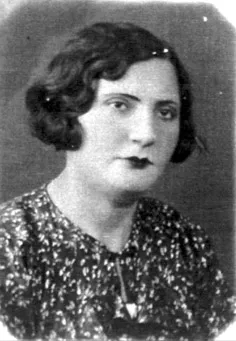Sarra Nikiforenko
I, Sarra Nikiforenko. The photo was taken in Kharkov in 1937 and sent to my dear ones in Baku with best regards.
In 1932 my husband was involved in a very important mission: filling strategic stocks of grain. Vitaliy was a very responsible employee. In 1933 he got an invitation to the military Academy in Kharkov. This was a good offer and he moved to Kharkov. He became head of the laboratory involved in scientific research of strategic food storage conditions. Vitaliy was also invited to teach politics and some technical subjects at the Military Academy. Kharkov was the capital of Ukraine before 1934. It was a big industrial center. In 1932 my older daughter Ludmila was born.
He received a nice two-room apartment in the apartment building for military officials and lecturers of the military Academy. I liked the apartment and our neighbors. It was a new house with a bathroom, toilet and electricity. In 1938 we got gas in the house. Wives of commanders of the Red army treated me nicely. My husband provided well for us and I didn't have to go to work. My husband worked a lot preparing for lectures and writing a textbook in chemistry. I was involved in public activities. Wives of military officials didn't work, but attended sport and amateur art clubs. I took part in sport competitions. I took the first place in shooting. I also took part in concerts singing Ukrainian and Russian songs. Once I was invited to study in Odessa Conservatory, a teacher heard me singing, but Vitaliy was against it. He didn't want to part with me.
In 1937 our second daughter Tamara was born. There was more things to do, but we took it easy. The prewar period can be determined with one word - 'enthusiasm'. We sang, laughed and believed in the wonderful future. We had little free time, but when we had some we went to the cinema. We got together with friends, had tea and sang Soviet songs from the movies we saw. My husband was very fond of his work. Thank God none of our relatives suffered from repression in 1930s. We were aware of the ongoing arrests and exiling people, but we believed that things were going right and the Soviet power was just. We had Jewish friends and neighbors and they didn't face any mistreats. My father often wrote me from Baku. He wrote about my brothers, sisters and their children.











